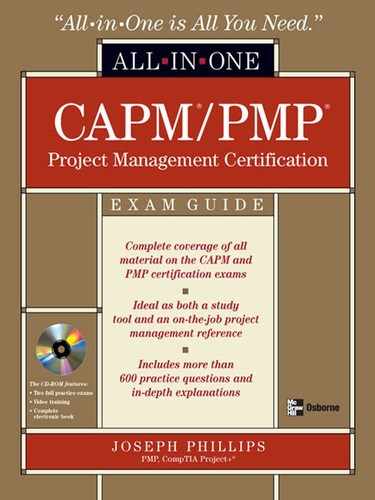Chapter 8. Managing Project Quality
What good does it do anyone if a project is launched and the monies and time are consumed by the project execution, but the quality of the project's deliverable is unacceptable? Imagine a project to build a new house, and at the project's completion, the house is tilting to one side, the windows all have cracks and holes in them, and the roof has obvious gaps for the rain and birds. This is not, I'm sure, what the homeowners had in mind.
Fortunately, in project management—in good project management—there are mechanisms in place to plan and implement quality throughout the project and not just as an afterthought. Project quality management is all about the project manager, the project team, and the performing organization working together to ensure that the project performs as the project plan calls for so that the project deliverable is in alignment with the project scope statement. Quality in a project is really all about creating a deliverable that satisfies the project requirements and is usable. It's about getting the project done and creating a deliverable that can actually be used by the project customer.
According to the American Society for Quality (ASQ), which the Project Management Body of Knowledge (PMBOK) quotes, "Quality is the degree to which a set of inherent characteristics fulfill requirements." Well, isn't that interesting? Let's go back in time. A project is launched and a project charter is issued to the project manager. Then the project manager and the project team create what document? The project scope statement. The project scope statement defines all of the requirements for the project, including what's in and what's out of scope. Quality is, therefore, satisfying everything that the project scope statement requires.
The PMBOK says that "stated and implied needs are the needs to developing project requirements." In the project scope statement, we define what the project will create, its requirements for acceptance, and the metrics to measure the project's success. In project quality management, we plan quality into the project, inspect the project and deliverables for the existence of quality, and then move towards the scope verification process, which confirms that you've created what your customer expected. Quality is about delivering on promises.
No discussion on quality is complete without a nod to our pal W. Edwards Deming. You likely won't need to know much about Deming for the exam, other than his famed Plan-Do-Check-Act cycle. (I highly recommend Mary B. Walton's book The Deming Management Method for the complete story of Deming—maybe after you pass your Project Management Institute [PMI] examination.) For your PMP and CAPM exams, know that Deming's philosophy on quality management considers customer satisfaction, prevention over inspection, a call for management responsibility, and a desire to do the work correctly the first time to be paramount.
NOTE
Examining quality control.
This chapter, I believe, is core to PMI's idea of project integration management. If quality suffers, then all of the knowledge areas are affected by the absence of quality. You can also see the effect on integration management if any of the other knowledge areas suffers in performance. Quality is directly affected by all of the other areas of project management, and there is equal impact on all the other knowledge areas if quality is missing. It's a busy, two-way street.
